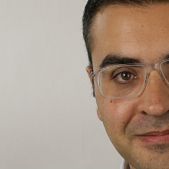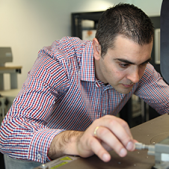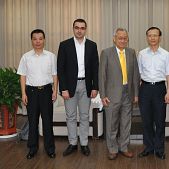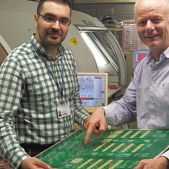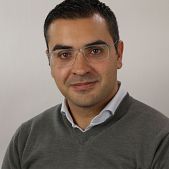
Developing state-of-the-art technologies with nanomaterials
Themis Prodromakis is a Reader professor in Nanoelectronics and an Engineering and Physical Sciences Research Council (EPSRC) Fellow affiliated with the Nano Research Group and the Southampton Nanofabrication Centre of Electronics and Computer Science (ECS) at University of Southampton. He leads a 20-people team with expertise that ranges from nanomaterials characterisation to electron devices, circuits and systems and biomedical devices.
Themis Prodromakis was born in Sydney and raised from the age of six in Aigio, Greece. He completed his M.Sc. in Microelectronics and Telecommunications at the University of Liverpool in 2004 and his Ph.D. in Electrical and Electronics Engineering at Imperial College London in 2008.
He started working as a research fellow in the department of Nanoscale Science and Technology at Imperial College London in August 2008. He remained in that position until April 2013.
For the period September 2010 – September 2011, he also worked as a visiting research fellow at UC Berkeley.
From April 2013 until present, he is a Reader Professor at University of Southampton and from October 2014, a visiting Professor at the Centre for Quantum Information and Interdisciplinary Science and Technology in China for guiding research in nanodevices and offering advice for establishing world-leading capabilities in the newly established center.
The Greek professor and researcher leads a 20-people team that develops ultrahigh density resistive memory chips based on transition metal-oxides. These memristor chips are employed both as next generation data storage and neuromorphic computing (collaboration with THALES and VENNEOS). The team is also developing next-generation neural interfaces that enable linking biological functions to electronics and biomimetic cell-culturing platforms manipulating the position and morphology of cardiac cells in vitro and also develops low-cost point-of-care diagnostics by exploiting PCB manufacturing techniques.
“Much akin to biological synapses, these memristive devices possess the intrinsic ability to simultaneously carry out computational tasks and store information at aggressively downscaled volumes and power dissipation. In this front, we recently demonstrated in an article in Nature Communications that the intrinsic characteristics of solid-state nanoscale memristors, such as input thresholding and analogue modulation of resistive state, can be used to encode neuronal spiking activity while suppressing noise”.
In 2015, he established ArC Instruments Ltd, a start-up that delivers high-performance testing infrastructure for automating characterisation of novel nanodevices.
Themis Prodromakis is a Senior Member of the IEEE, a Member of the INE and the IET, serves as a member of the BioCAS, Nanoelectronics and Gigascale Systems and the Sensory Systems Technical Committees of the IEEE Circuits & Systems Society. He is also a member of the IEEE Nanotechnology Council, representing the CAS society and Associate Editor for Nature’s Scientific Reports, IEEE Sensors and the Frontiers in Neuromorphic Engineering. He has authored two books, has more than 160 publications in major scientific journals, owns 10 patents and has established more than five million euros in foundations.
Dr Prodromakis is also the Director of the Lloyds Register Foundation International Consortium for Nanotechnology, a global initiative for building a safer world with nanotechnologies. His contributions on electron devices were recognised by his appointment as a member of the Semiconductor Research Corporation (SRC) Emerging Research Devices working group that produces the International Technology Roadmap for Semiconductors (ITRS).
Recently, the world-famous foundation Lloyd’s Register honored him for his contributions by naming him 100A1 Ambassador.
In 2017, he has been awarded a Royal Society Industry Fellowship to progress the development of bioelectronics that would revolutionise the treatment of nervous system disorders.
The four-year fellowship, a collaborative partnership with pharmaceutical company GlaxoSmithKline (GSK), will exploit the potential of memristive devices across an ambitious programme from September 2017. The project aims to deliver a platform technology that will address the current limitations placed on implantable neural devices by bandwidth and power constraints. The advance would enable the integration, analysis and interpretation of data in real-time while requiring minute power and chip area.
“Through this award we aim to exploit this concept for building a highly scalable integrated neural activity decoder. The availability of such a technology would revolutionise the development of embedded devices for treating a wide variety of nervous system disorders.”




